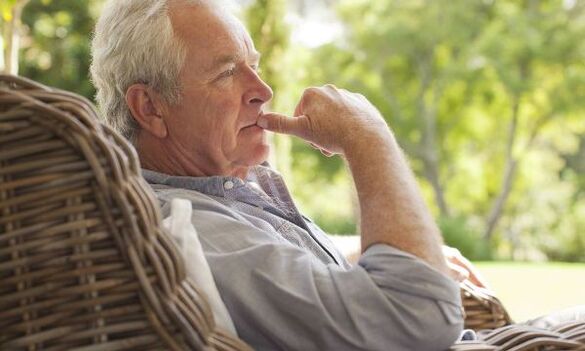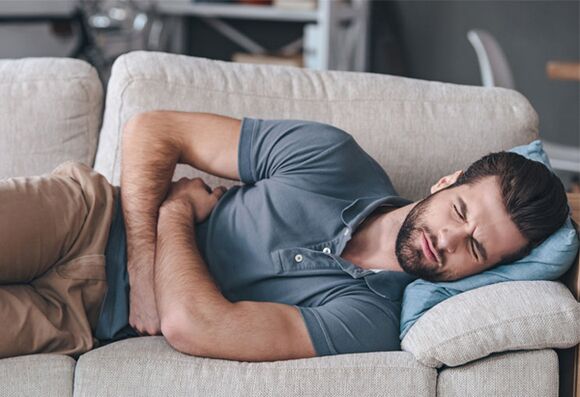In prostatitis, there is an inflammatory process in the prostate area. This is one of the most common urological diseases. The causes of prostatitis in men are different.

What is prostatitis?
The disease is accompanied by a violation of urination. Often a man has a feeling of incomplete bladder emptying.
The main causes of acute bacterial prostatitis are infections that:
- transmitted during intimacy (ureaplasmosis, chlamydia);
- penetrate the urethra from the rectal area (infection with Klebsiella, Pseudomonas aeruginosa).
If the prostate becomes inflamed, a man's emotional state can quickly deteriorate. In this case, the libido fades.
Deterioration of the nervous system can be characterized by the following symptoms:
- anxiety;
- worsening mood;
- sleep disorder;
- increased irritability.
Where does prostatitis in patients come from?
It is worth explaining what causes acute or chronic prostatitis in men. The likelihood of developing the disease increases under the influence of the following main factors:
- promiscuous sexual relations;
- non-compliance with basic rules of personal hygiene;
- urine reflux into the bladder area;
- phimosis;
- hypothermia;
- strong emotional shock;
- blood stagnation in the pelvic region.
Causes of disease
Acquired causes of prostate inflammation include:
- narrowing of the urethra. This leads to worsening of urine outflow and increased pressure in the urethra;
- perineal injury, which caused the onset of a chronic inflammatory process;
- prostate stones;
- hard physical work;
- the presence of a chronic inflammatory process in which the vessels of the prostate are affected.
Acute and chronic infectious pathologies
The inflammatory process in the prostate may be due to some other disease. These pathologies include: gonorrhea and urethritis. The following diseases can also cause the development of the disease:
- cystitis;
- angina;
- incompletely treated caries;
- tuberculosis.
In the presence of foci of acute or chronic infection, you must first eliminate the underlying cause of the disease: neutralize the activity of the infectious agent.
congestion
Congestive (congestive) prostatitis is often accompanied by damage to testicular tissue. With this pathology there is a violation of spermatogenesis, the process of synthesis of sex hormones is slowed down. Erectile dysfunction often occurs in congestive prostatitis.
The risk of chronic congestive prostatitis increases under the influence of the following factors:
- low physical activity;
- muscle weakness in the pelvic floor;
- prolonged abstinence from intimacy;
- terminate sexual intercourse, as a way of protection against unwanted pregnancy;
- frequent constipation;
- the presence of cancer;
- decreased vascular tone;
- occurrence of complications after surgical intervention on the pelvic organs;
- varicose diseases of the pelvic veins.
Treatment of congestive prostatitis involves the use of nonsteroidal anti-inflammatory drugs. These drugs eliminate discomfort, reduce tissue swelling.
If indicated, antiplatelet agents are used. These drugs improve the blood thinning process.
In congestive prostatitis, the introduction of sulfated mucopolysaccharide in the form of injections, the use of nicotinic acid is indicated.
Venotonics help increase the strength of venous walls. Drugs from the group of alpha-blockers help to improve the outflow of urine. In some situations, with obstruction in the prostate area, immunomodulators, muscle relaxants and sedatives are used.
Sedentary work
An inactive lifestyle causes the appearance of stagnant processes in the prostate tissues. Due to the passive conduction, the functions of the nervous and endocrine systems deteriorate. The risk of developing prostatitis increases in unfavorable environmental conditions.
Prolonged abstinence
With prolonged abstinence, stagnation of semen is observed. Pathogenic microorganisms can begin to multiply in it, which causes the appearance of an inflammatory process in the prostate.
With prolonged abstinence, sexual desire disappears. Low sexual activity can also cause impotence.
hypothermia
Under the influence of low temperatures, the corresponding vessels narrow. In that case, there is a disturbance in the blood supply to the prostate, which leads to a deterioration in the nutrition of the organs.
To avoid hypothermia, you need to follow simple recommendations:
- it is advisable to wear outerwear appropriate to the season;
- it is necessary to avoid a longer stay in the wind, in the immediate vicinity of the air conditioner.

Causes of prostatitis in men after 40 years
Inflammation of the prostate in young men develops under the influence of the following causes:
- pelvic congestion;
- the presence of latent infectious diseases (chlamydia, trichomoniasis). With such pathologies comes a sluggish inflammatory process in the tissues of the prostate.
Causes of prostatitis in patients older than 55 years
The disease after the age of 55 can be influenced by the following factors:
- androgen deficiency;
- the presence of pelvic floor muscle atrophy;
- weakened immunity due to chronic infections;
- slowing of blood flow;
- loss of sexual function;
- weakening of the sphincter located in the bladder area.
One of the reasons for the development of prostatitis is the overweight patient. Excess weight creates increased pressure on the area of the venous pelvic plexus.
Other causes of disease development
According to psychosomatics specialist (Louise Hay), a man's health depends on the mental state of the stronger sex. According to this theory, the causes of prostatitis can be the following:
- a feeling of inability to control the main events of your life;
- internal experiences due to sexual failure;
- a sense of guilt towards a partner.
The pathology is often diagnosed in older men who experience insecurity in their abilities.
To prevent the development of prostatitis at this stage of life, you must learn to think positively. A man should not focus on what depresses him.
Where does prostate pain hurt in men?
It is worth explaining where it hurts in advanced prostatitis. As the disease progresses, pain occurs in the following parts of the body:
- scrotum;
- penis
- lower back;
- anus region.
What kind of pain occurs in prostatitis in men depends on the following factors:
- disease stages;
- localization of foci of inflammation.
With long-term prostatitis, pain in the area of the seminal glands and vesicles may occur.
Pain in the legs
It is worth knowing what the main symptoms of prostatitis are, what hurts. When the prostate becomes inflamed, blood circulation is disturbed. This can cause pain in the lower extremities.
In some cases, bacterial prostatitis develops reactive arthritis. In this case, the pain does not occur in the muscles, but in the area of bone tissue or joints.
Testicular discomfort
One of the signs of the disease is pain in the perineum. It can spread to the penis, pubis, testicles. Discomfort in the testicles and inguinal folds occurs when the seminal vesicles are affected.
Unpleasant sensations of cracking in the testicles and prostate are observed in the presence of a purulent process. In this case, the course of the disease is complicated by violation of the urination process, severe weakness, fever.
Discomfort in the anus
The main cause of pain in the anus is that the prostate is located next to the rectum. At the same time, the unpleasant sensations are shooting in nature. Discomfort is exacerbated by defecation.
Pain that occurs with inflammation of the prostate can be accompanied by constipation, bloating.
Back pain
Back pain is one of the symptoms of the disease. The discomfort is often accompanied by a feeling of the presence of a foreign body in the anus. Similar symptoms indicate a violation of body functions in chronic prostatitis.
Pain in the lower abdomen
As the disease progresses, the volume of glandular tissue of the organ increases. Pain in the lower abdomen is often sharp. In this case, the inflammatory process has affected the bladder and rectum.
After the treatment, the swelling disappears. The prostate is reduced in size. As a result, the pain in the lower abdomen becomes less pronounced.
Localization of pain
If you feel pain, you need to undergo a complete medical examination. A similar localization of pain has been observed in rectal disease, prostate cancer.
Pain relievers
An analgesic and an antipyretic from the pyrazolone group are used to relieve discomfort. The tool helps relieve pain, has anti-inflammatory effect.
Diphenhydramine hydrochloride has anesthetic properties. The tool helps to relax smooth muscles. The drug has a calming effect on the nervous system. NSAIDs from the sulfonanilide class have pronounced anti-inflammatory and analgesic properties.
Effective folk remedies also help reduce pain:
- Burdock infusion.It is necessary to pour 10 grams of previously chopped plant root with 200 ml of water. The product is cooked on low heat for 10 minutes. After that, the broth is infused for 30 minutes. Take 100 ml twice a day. The decoction is consumed 30 minutes before meals. The average duration of the course is determined individually.
- Pumpkin seeds.Eat 1 tablespoon of vegetable seeds twice a day. Pumpkin seeds should be eaten 60 minutes before eating. The average duration of the course varies from two to three months. Pumpkin seeds are characterized by pronounced antiseptic properties.
Before using painkillers, you should consult a urologist. Appropriate agents can cause side effects.
Prostatitis, whose psychosomatics are quite complex, can be prevented. This requires moderate physical activity, a balanced diet, renunciation of bad habits, regular sexual intercourse.




































